 The SEC recently reached a $3 million collective settlement with seven public companies charged with violating whistleblower protection Rule 21F-17(a). This rule prohibits any actions by companies that impede an individual from communicating directly with the SEC staff about a possible securities law violation they observe. Continue reading
The SEC recently reached a $3 million collective settlement with seven public companies charged with violating whistleblower protection Rule 21F-17(a). This rule prohibits any actions by companies that impede an individual from communicating directly with the SEC staff about a possible securities law violation they observe. Continue reading
Two SEC Whistleblowers To Share $24M in Awards
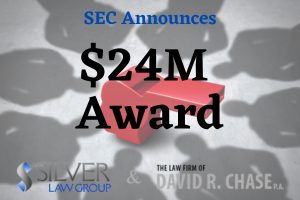 The SEC recently announced that it has awarded money to two whistleblowers for their information that led to an SEC enforcement action against a company as well as a related action against the same company by another federal agency. Both individuals voluntarily provided critical information that led to the successful enforcement actions. Continue reading
The SEC recently announced that it has awarded money to two whistleblowers for their information that led to an SEC enforcement action against a company as well as a related action against the same company by another federal agency. Both individuals voluntarily provided critical information that led to the successful enforcement actions. Continue reading
Two SEC Whistleblowers Awarded $98M
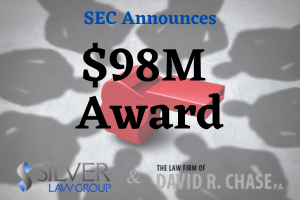 The SEC recently awarded two whistleblowers a total of $98M for original information they submitted that led to the opening of an investigation and a successful enforcement action involving misconduct.
The SEC recently awarded two whistleblowers a total of $98M for original information they submitted that led to the opening of an investigation and a successful enforcement action involving misconduct.
The first whistleblower received the lion’s share of the bounty, which totaled over $87 million. For the second whistleblower, the award totaled over $16 million. Both awards were percentages of the financial sanctions collected in the case, which both included SEC actions as well as another enforcement action by a different federal agency. Continue reading
CFTC Awards Over $1 Million to Whistleblower for Digital Asset Trading Tip
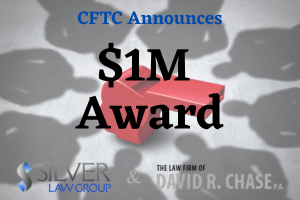 On August 8, 2024, the U.S. Commodity Futures Trading Commission (CFTC) announced a whistleblower award of over $1 million dollars. While the Commodity Exchange Act ensures confidentiality protections for CFTC whistleblowers, this award highlights the CFTC’s commitment to regulating digital assets.
On August 8, 2024, the U.S. Commodity Futures Trading Commission (CFTC) announced a whistleblower award of over $1 million dollars. While the Commodity Exchange Act ensures confidentiality protections for CFTC whistleblowers, this award highlights the CFTC’s commitment to regulating digital assets.
The heavily redacted CFTC order states that the whistleblower received the award because the whistleblower voluntarily provided the information, through form TCR, and their information led to a successful enforcement action. Continue reading
Kyle Bass Gets Reversal Of SEC Whistleblower Award Denial
 Billionaire investor and founder of Hayman Capital Management, Kyle Bass, succeeded in obtaining a reversal of the SEC’s denial of his bid to receive a whistleblower bounty for exposing fraud at United Development Funding (UDF), a Dallas-based land developer. Bass filed a whistleblower tip regarding UDF to the SEC after one of his analysts found proof that it was a Ponzi scheme. Continue reading
Billionaire investor and founder of Hayman Capital Management, Kyle Bass, succeeded in obtaining a reversal of the SEC’s denial of his bid to receive a whistleblower bounty for exposing fraud at United Development Funding (UDF), a Dallas-based land developer. Bass filed a whistleblower tip regarding UDF to the SEC after one of his analysts found proof that it was a Ponzi scheme. Continue reading
In Defense Of SEC Whistleblower Short Sellers: They Deserve To Have Their Cake And Eat It Too
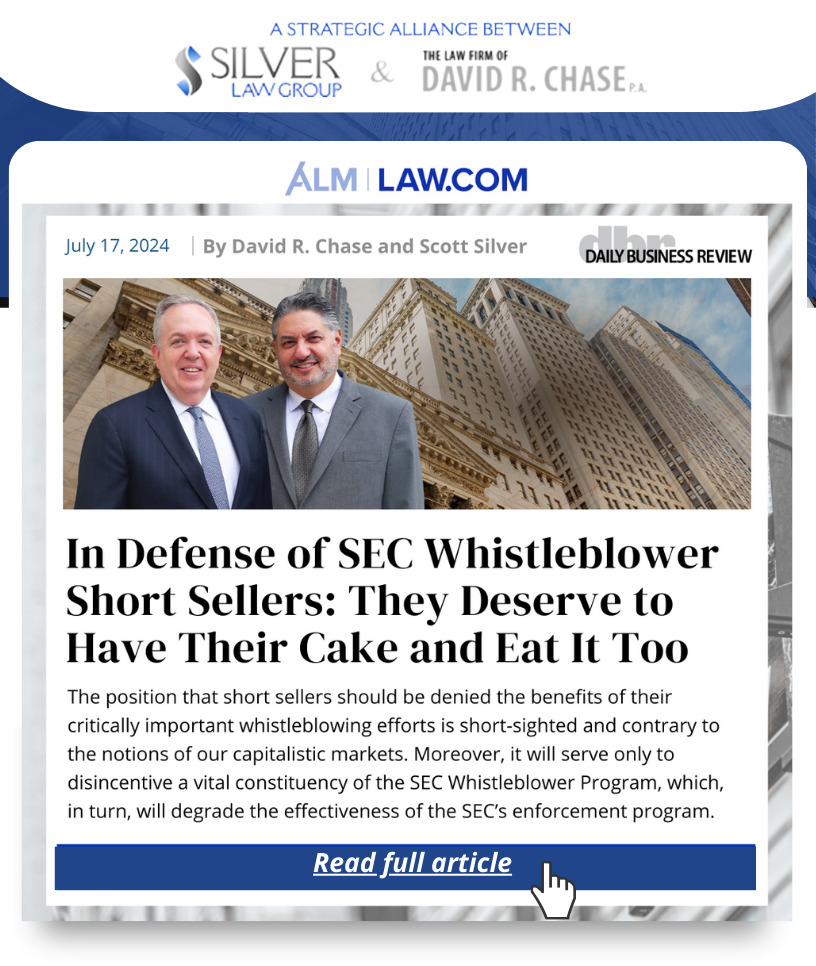 David R. Chase and Scott Silver co-authored an article for the Daily Business Review that advocates for short sellers being allowed to benefit from the SEC Whistleblower Program.
David R. Chase and Scott Silver co-authored an article for the Daily Business Review that advocates for short sellers being allowed to benefit from the SEC Whistleblower Program.
Click here to read the full article.
Insider Information Pays Off: SEC Issues $37 Million Whistleblower Award
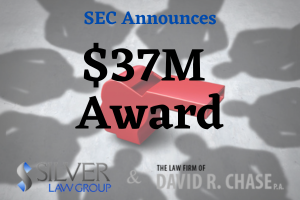 On June 17, 2024, the U.S. Securities and Exchange Commission (SEC) announced a $37 million dollar whistleblower award, marking this the first whistleblower award of 2024. While the Dodd-Frank Act mandates confidentiality regarding the whistleblower’s identity and enforcement action, this substantial award underscores the SEC’s ongoing commitment to investor protection. Continue reading
On June 17, 2024, the U.S. Securities and Exchange Commission (SEC) announced a $37 million dollar whistleblower award, marking this the first whistleblower award of 2024. While the Dodd-Frank Act mandates confidentiality regarding the whistleblower’s identity and enforcement action, this substantial award underscores the SEC’s ongoing commitment to investor protection. Continue reading
The CFTC Establishes New Whistleblower Protections In A Landmark Settlement
 On June 17, 2024, the U.S. Commodity Futures Trading Commission (the “CFTC”) reached a $55 million settlement with Trafigura Trading LLC, marking a significant aggressive shift in the agency’s approach to whistleblower protections. This case sets a new precedent in the CFTC’s enforcement program and underscores the CFTC’s commitment to protecting whistleblowers. Continue reading
On June 17, 2024, the U.S. Commodity Futures Trading Commission (the “CFTC”) reached a $55 million settlement with Trafigura Trading LLC, marking a significant aggressive shift in the agency’s approach to whistleblower protections. This case sets a new precedent in the CFTC’s enforcement program and underscores the CFTC’s commitment to protecting whistleblowers. Continue reading
CTFC Awards Over $4.5M To Whistleblower
 The Commodities Futures Trading Commission (CTFC) announced a whistleblower award of over $4.5 million for information and assistance that led to a successful enforcement action. The individual received an unspecified percentage of the monies collected in fines and sanctions. Continue reading
The Commodities Futures Trading Commission (CTFC) announced a whistleblower award of over $4.5 million for information and assistance that led to a successful enforcement action. The individual received an unspecified percentage of the monies collected in fines and sanctions. Continue reading
CFTC Awards $1.25 Million To Whistleblower
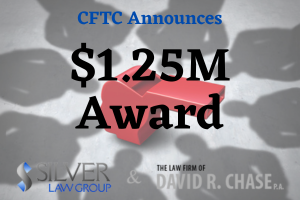 The latest $1.25 million award from the Commodities Futures Trading Commission (CFTC) goes to a whistleblower who first reported misconduct internally to their employer, who then ignored the report. Following 120 days of the company’s inaction, the individual submitted the information to the CFTC, who immediately opened an investigation. Continue reading
The latest $1.25 million award from the Commodities Futures Trading Commission (CFTC) goes to a whistleblower who first reported misconduct internally to their employer, who then ignored the report. Following 120 days of the company’s inaction, the individual submitted the information to the CFTC, who immediately opened an investigation. Continue reading
 SEC Whistleblower Lawyer Blog
SEC Whistleblower Lawyer Blog

